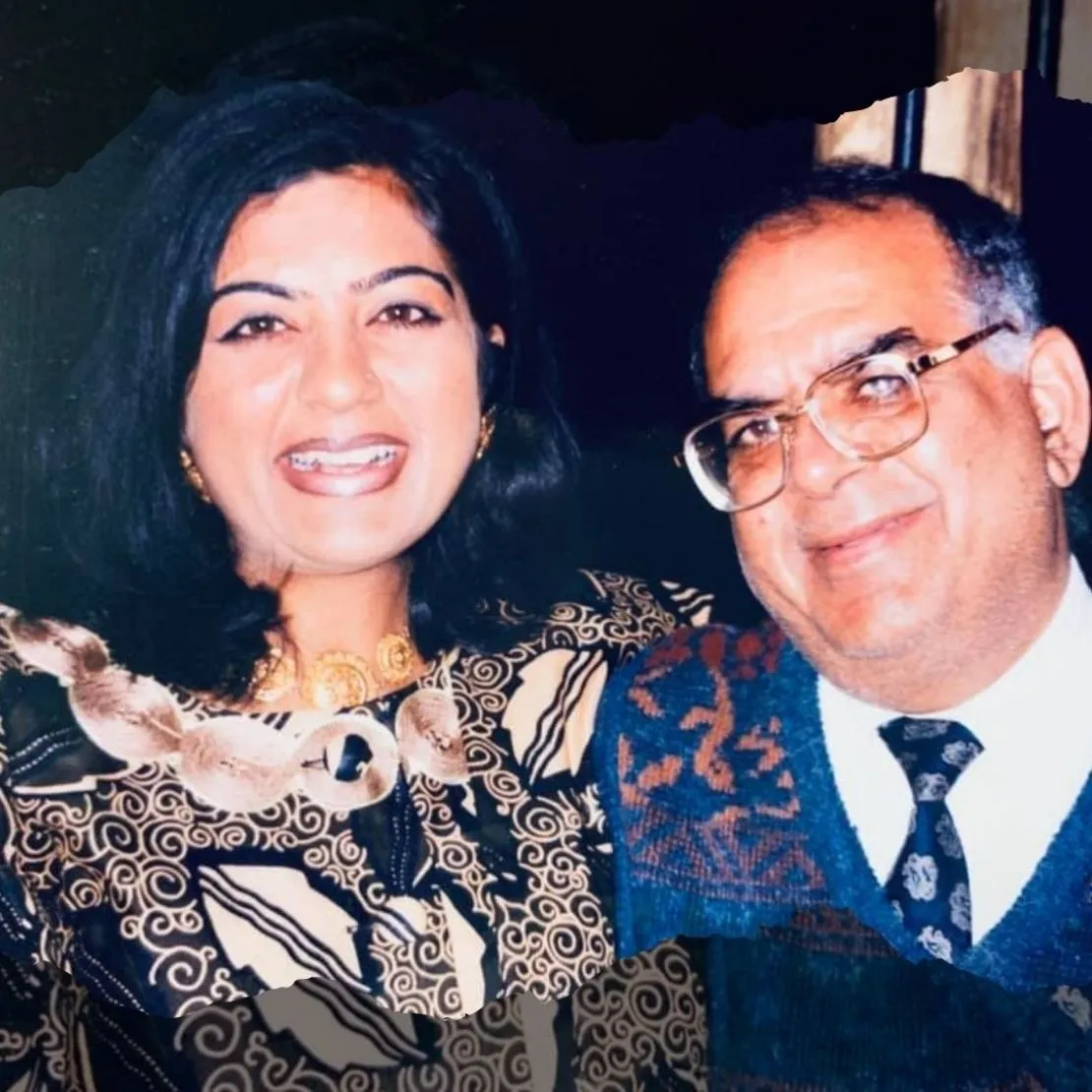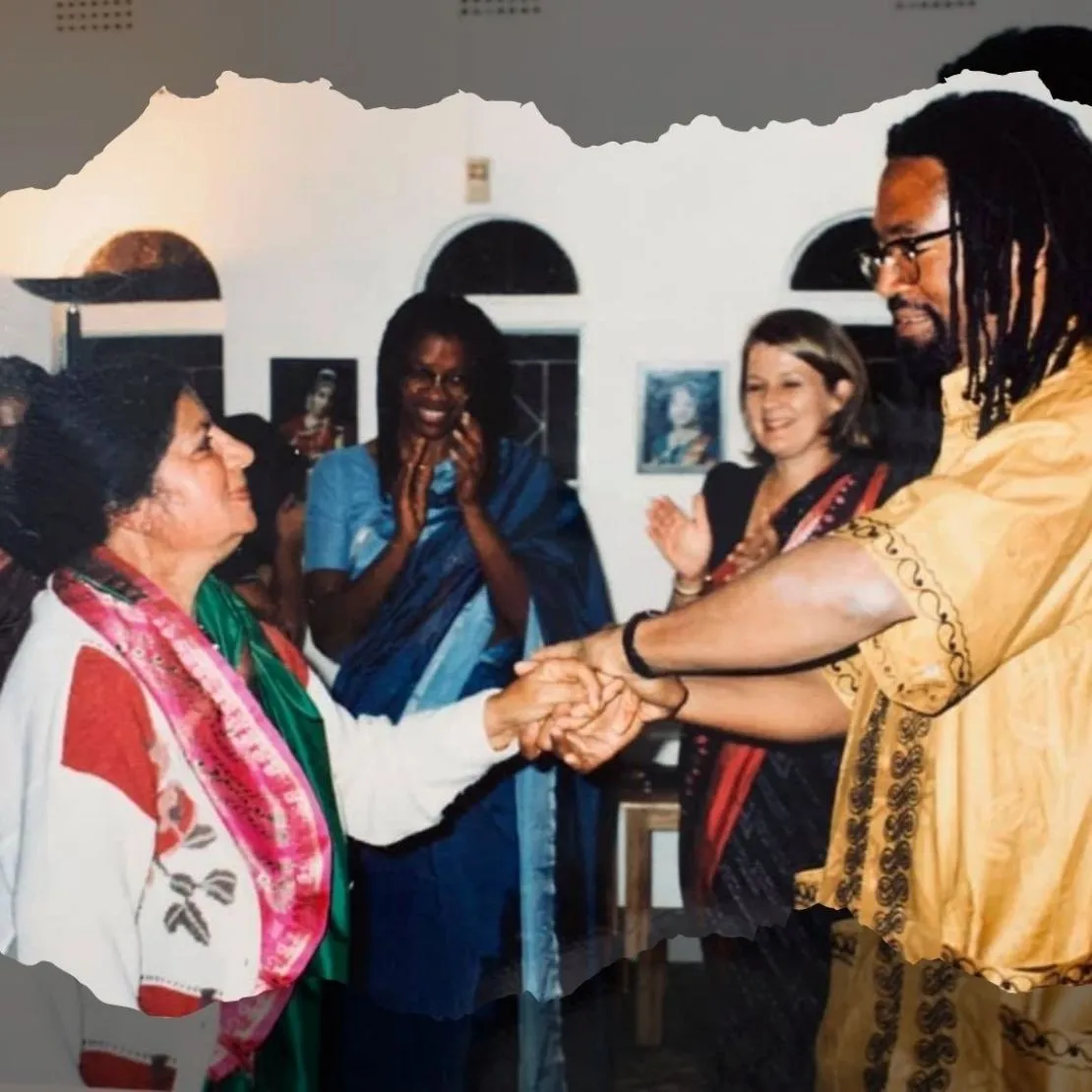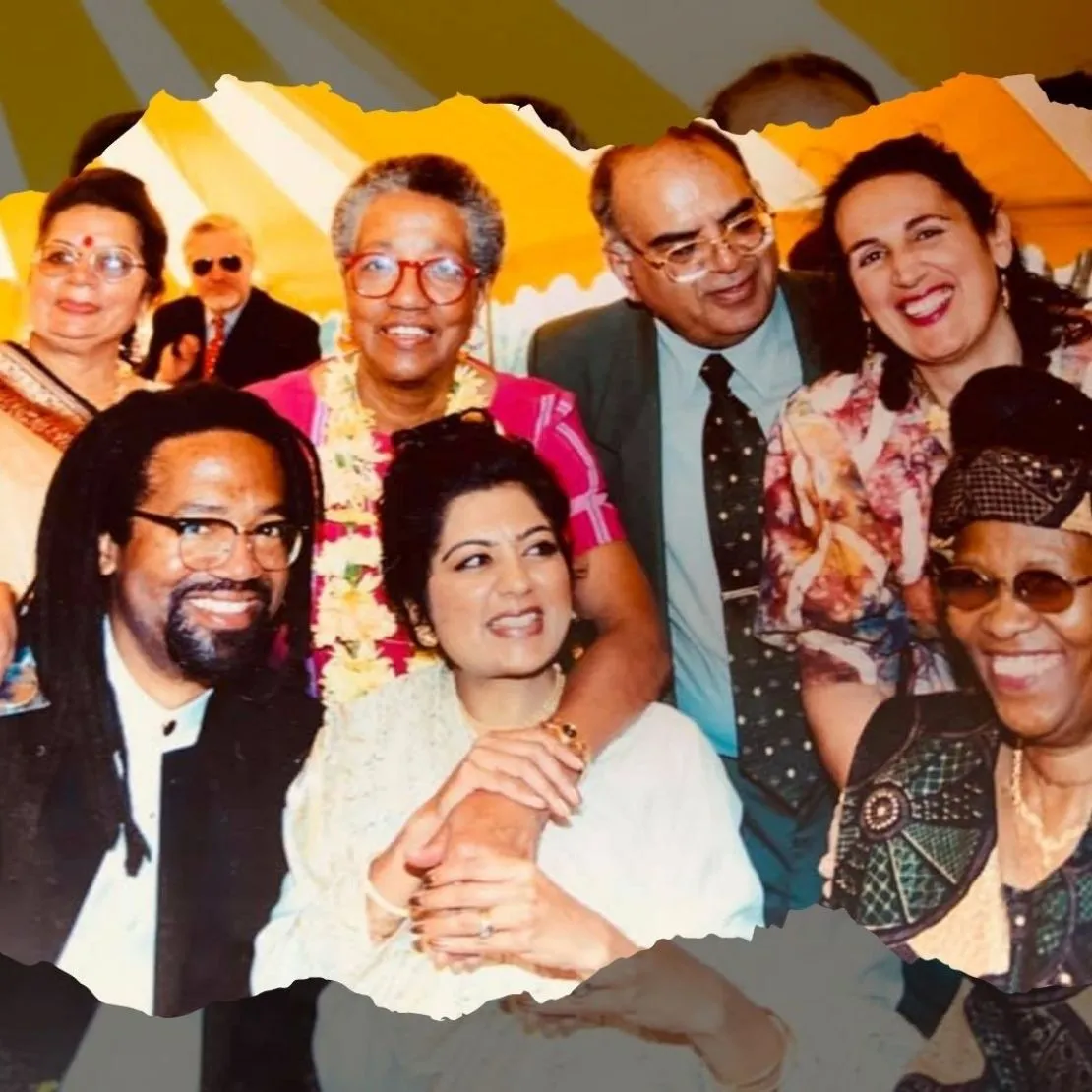By the time I made it to my wedding day, I had encountered a deep anti-Blackness among Desi folks
Note: These themes are explored in Gayatri Sethi's forthcoming book 'Unbelonging' from Mango and Marigold Press.
The June Botswana winter sun beat down on us as we exchanged wedding garlands of marigolds. I was dressed in an ivory ghaghra adorned in my Nani’s wedding jewellery passed down from my ma to me for today. I gazed up at the hundreds of beaming faces looking up at my beloved and I as we exchanged rings and wedding vows. My eyes rested on my Mataji, paternal grandmother, seated next to my pa. She was visiting from New Delhi to attend the wedding and she had blessed the consent to our marriage. Even as my heart soared to see so many beloveds gather to ululate and applaud my marriage to Charles, I was keenly aware of who was missing.
I partnered with a soul dreadlocked and Black
who wore Malcolm X glasses to gaze my way
in acceptance and and admiration
I had not known
even from my own...
I almost turned my back on him
I almost ghosted his affections
and shunned his attentions.
Why?
Anti-Black racism.
Most of my maternal relatives had declined to attend. Earlier that morning, as my mother adorned me in her jewellery and chanted mantras to bless me, the phone rang. Her relative called to remind her that I was making a mistake. He said it was not too late, and “the Blacks” from America are not like the ones in Africa. For the umpteenth time since my engagement, he offered all the offensive reasons why my marriage was a terrible idea for me and for our family.
I took some breaths, swallowed the rageful tears. I was late to the wedding, but we married.
Many in our Desi-Indian community in Gaborone had boycotted the occasion with gossip and declarations that they did not want their daughters “getting the wrong idea.”
Out there in the world unaccepting
of our togetherness
denying our love
whispering and gossiping
what will people say?
Log kya kahenge?
Although I was born and raised in East Africa and our wedding was taking place in Gaborone, it was virtually unheard of and beyond the rules of “good Indian womanhood” to marry a person of African descent. This was 1999 and I had never knowing of such an interracial marriage occurring in our community. I had been raised to be a “good beti” and the news of my marriage to an African American who was a father of an eight-year-old son was frowned upon.

My pa was progressive in many ways. He believed in educating his daughters and sisters. He blessed my studies abroad when I earned a scholarship to go overseas to Chicago. He had met Charles a full year before the wedding. After much deliberation, he consented to the marriage. He had been raised in India among Arya Samaj Hindus but had embraced the Baha’i faith in his late twenties. He had subsequently left India for East Africa, never to return except for brief visits and family occasions. It would be fair to say that his extended family somewhat disowned or distanced him for these decisions.
In the months leading up to my wedding, I heard versions of these commentaries more often than I can recount.
You cannot marry a Black person.
Kalon se shaadi mat karo.
We do not accept it.
(Punjabi warnings of impending doom)
If you insist, you will be disowned.
We will boycott the wedding.
You are going to regret this decision.
Did I mention these, and other suppressed commentaries to my beloved? I did not.
Often, these hurtful beliefs and practices recounted in great detail to convince desi folks of our racism impact and hurt our Black kin. Even as I offer general examples of the exclusions we have experienced; I refrain from regurgitating details that will harm my Black kin. After all, I sense that reiterating racist insults is a form of anti-Blackness.
Growing up, I was called a “kali” and African child by my cousins. When we visited them in Delhi or Chandigarh, it was apparent to me that something about me was unacceptable to them. I did not have the words or clarity about what this elusive unbelonging was until one year when I was perhaps, fourteen, and attending boarding school in India. My parents were frustrated by what they say as my westernized comportment. I refused to make chai and food. I was resentful that my brother was allowed leeway to come and go as he wished. I was deeply unhappy about the strict rules that required me to bite my tongue and obey. We butted heads a lot. To them, I was rebellious, outspoken and pushed back on desi family norms. Even as I studied hard, was an exceptional student and met many of the respectable India girlhood criteria, it became clear to them that I was not a rule follower. Their response was to banish me to boarding school in Panchgani to teach me how to be “more Indian.” This did not quite pan out.
I was visiting the relatives during this awkward identity crisis ridden teen phase of my banishment from home when I realized just how “rebellious” I was. I was shelling peas for the lunch-time dish we would eat of matar paneer. An elder, in this intimate space, spoke softly. “You are African, and you don’t understand our Indian ways.” I looked up realizing how true this statement might be. I had felt it all throughout my childhood. To hear it said by the people who helped make me feel this sense of being out of place among my own was confusing. She then proceeded to say the words that are etched in my soul.

“You may be raised in Africa, but you must not marry a Black person.”
Even as I was calm shelling peas moments before, my heart now raced, and I felt a heat rising within me from the very depths of my being. I could barely catch my breath and my palms were far too sweaty to continue. If the first time were not enough, my silence prompted her to repeat herself. She restated both the requirement that I would marry, as all desi women must but also that it would have to be “one of our own”
I remained silent even as I felt the lifelong impact of this heart wounding. I knew then, deep within, that I would not live up to obey this command. It was an order. It was an injunction to marry a desi. At the time, I vowed not to marry. Fourteen-year-old me became a feminist before she had the words to call herself this word. I did not respond to my elder. It was just not done. I did not argue, fight or raise my words. I respected my elder with my silence, as I was taught. In my heart and mind, I refused to comply. I was fourteen when I made up my mind to refuse this way of being. After all, I was raised in Africa by Black folks. A brown desi child raised in Africa had to choose another way. But I did not know how.
By the time I made it to my wedding day, I had encountered relentless comments and requests to marry one’s own people, and to shun Black folks, to be cautious who I invite in friendship or alliance. To grow up in Africa and live in the US and still be well versed in this aspect of desi culture speaks volumes. Most of us are familiar with these hushed words and mocking insults towards kale log. Even my friends who dated chose other folks sharing their community identity, language and caste. Those who were liberal, dated white men. The often-unspoken rules of who we befriend and who we socialize with were part of an insidious deeply rooted anti-Blackness among desi folks in India and even those who reside in Africa.
Breaking these stringent rules comes at tremendous cost most of us are unwilling to pay. It is a perpetual unbelonging to our own families and communities. Most of us are still unwilling to bear these consequences to live in our truths,
We overlooked the opposition
we overcame the hypocrisies
of our folks and kin
We traded unbelonging
to that anti-Blackness
to embrace our beloved
with resolve fearless
to partner up
for a turbulent journey
most worthwhile
ongoing
to unlearning and unbelonging…
Over the years, I have struggled to fully grasp these dynamics and their impact on who I am and who I chose to be. Many years later, I wrote these words in my journal to express how anti-Blackness is rooted in our midst:
When we are neither Black nor white, when we are either benefitting from proximity to whiteness or when we are selective in feigning allegiance to Black folks... when we are discreetly privately in our homes uttering anti-Blackness while claiming in public the rights of being people of color...we stop on the throats of Black folks as we climb master’s ladders but we are the tools and fools of whiteness. We are colonizers in brown skins.
I am now a mother of Black children residing in the United States. Despite all the perilous predictions of my demise in marrying Charles, we have weathered and enjoyed twenty-one years of marriage. When we enter desi spaces, we know hushed whispers and turned away glances. When we enter desi family interactions, we brace ourselves for anti-Black commentary. When we meet desi folks, they generally find us aloof and guarded. Any wonder why? The relatives who boycotted our wedding did not necessarily come around to accept us. We are estranged. In these days when increasing awareness of racism and racial justice are surfacing, we find ourselves even more removed from those who chose to turn their backs on us. Although we visited India to see the relatives and were met with hospitality and generosity that warmed our hearts, we were also greeted with the kind of hands-off tolerance that desi folks reserve for polite company rather than our kin.

I continue to write verses and rambling musings to sort my way through these ongoing struggles with anti-Blackness. Recently, after encountering violent anti-Black commentary about the Black Lives Matter movement in desi online groups, I wrote:
Anti-blackness is rooted in us. It is in intimate spaces. It is in the eyes of disapproval of our aunties. It is in the hushed tones of gossip of our cousins. It is the cautionary discipline of our elders. Anti-blackness lies not just in attitudes and words, but it is systemic and structural too.
Anti-blackness is intimately connected to those systems of caste and color that desi folks adhere to everywhere they live. In southern Africa, apartheid taught us anti-Blackness just as much as our colonial histories were deeply anti-Black. These words and structures are shackles. How do we even get free?
Mine is not necessarily an easily told story of resilience and faith with a happy ending of acceptance and forgiveness. The heartbreak of losing community over anti-Black racism is ongoing. Even those friends and relatives who appeared to be open minded and liberal have shown incapable of fully grasping what it means to stand with us. I am often asked to spell out the details of the intimate woundings we have experienced over the years. I refuse this out of respect for my Black kin. Even as many desi folks continue to uphold these antiquated beliefs and impose them of younger generations, I write to affirm that we exist. Those of us breaking those traditions to build inter-racial families with Black folks have existed and thrived globally for a long time.
Freeing myself
from oppressive
deeply ingrained
omnipresent
shackles of
colorism
caste-ism
Anti-Blackness
to which I was born, raised and possessed.
I battle to get free daily.
I uproot the racism
rooted in me
one idea
one gesture
at a time
all my life.